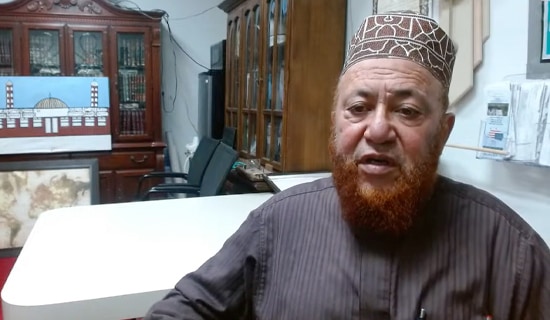On March 31, 2007, Libyan leader Mu'ammar Qaddafi called, in a speech in Niger to Tuareg tribal leaders , for the establishment of a second Shi'ite Fatimid state in North Africa, after the model of the 10th-13th century empire that ruled North Africa, Egypt, and parts of the Fertile Crescent. In his speech, Qaddafi denounced the division of Muslims into Sunni and Shi'ite as a colonialist plot, and rebuked the Arab League members for "hating Iran."
At the beginning of the month, on March 1, 2007 – the eve of the anniversary of the coup that brought the Libyan Free Officers to power – Qaddafi gave a speech in which he denied the existence of a non-Arab Berber people (this also being a colonialist plot), provoking protest among Berbers and supporters of minority rights in the Middle East and North Africa.
The following are excerpts from Qaddafi's speeches:
"Colonialism… Has Begun to Group the Arabs Against Iran and Iran Against the Arabs"
"… Today there is a divide [in the Islamic world] that we must acknowledge, and we must know who is deepening it. Perhaps it is colonialism, the enemy of Islam, the enemy of the Arabs, the enemy of the Persians, that is deepening it…
"They have divided Islam into two Islams, and there came to be Shi'ite Islam and Sunni Islam. This is a forbidden innovation [bid'a]… When did Muhammad say: 'I have brought you Shi'ite Islam and Sunni Islam?...
"As a consequence of this, they have now begun to group the Arabs against Iran and Iran against the Arabs, and then Shi'ites against Sunnis and Sunnis against Shi'ites.
"Are we Muslims, or are we Shi'ites and Sunnis?! For whose benefit is this? It is for the benefit of the 'other' that we are speaking about, for the benefit of the enemy, for the benefit of colonialism.
"The period of fragmentation that I talked about, and the disintegration of the Abbasid Empire and its old age, is similar to the old age of the Arab and Islamic regimes we have today. At the beginning of the 10th century, the situation was like this…
"The Fatimid state arose in the beginning of the 10th century, and it formed an umbrella over North Africa, and under its banner all of the tribal, denominational, political, and ethnic differences fused, and they all became one single Fatimid identity, which lasted 260 years and extended as far as the Arab East.
"After Mahdiya, Cairo was the capital of the Fatimid state, and it inherited the disintegrated Abbasid state, which had become weak at that point in time…
"The Fatimid state came as a new, youthful power. Its name and origin are from Fatima Al-Zahra [Fatima 'the Radiant'], and it produced Al-Azhar.[1] One of the historic citadels of the Fatimid state was Al-Azhar, and the name of Al-Azhar, in Egypt, is in reference to Fatima Al-Zahra, the daughter of the Prophet. The Fatimid state's name and origin were [also] from Fatima Al-Zahra…
"This grand Fatimid state generously allowed the existence of the mini-states in its interior… They all became Fatimids, and there was stability.
"Now people say to us that the Shi'ites are in Iran and that Shi'ite means Persians, and Sunni means Arabs. This is a lie. This is deceit. Those who say this are ignoramuses who do not know history.
"To the contrary, the first Shi'ite state arose in North Africa. The Fatimid state was the first Shi'ite state…"
"North Africa is Arab and Shi'ite"
"In North Africa… go anywhere and ask them about their customs and traditions. They are all Shi'ite customs and traditions.
"[They include] the celebration of the 'Ashura, the sorrow on the 'Ashura and the remembrance of the 'Ashura and our lord [sayyidna] 'Ali; the very extensive stories about our lord 'Ali, and being the party of [tashayyu' l-] our lord 'Ali.
"[The North Africans] do not know Mu'awiya ['Ali's rival and the founder of the Umayyad dynasty]. From Egypt to the Atlantic Ocean, there is not a single person named Mu'awiya. They are all named 'Ali, Fatima, Khadija, Hassan, Hussein, etc.
"Since the [trend] today is religion, and [discussion of] who has the right to the Imamate, and what is the Imamate, and so forth – who has more right to the Imamate than the Prophet's family [ahl al-bayt]? The Prophet's family has more right than all of the rulers around today who are not from the Prophet's family.
"When we come to religious authority… have [people] not gotten themselves into a mess and said that the Sunnis are against the Shi'ites and the Arabs against the Persians? Who holds to this view? It is the foreign occupation and the Zionist settlement that brought this.
"Where did this come from? [But] as long as you are getting yourselves into a mess [by saying you are] Shi'ites and Sunnis, then go ahead, [but] the Shi'ites [then] are not Iran."
"The Shi'ite Fatimid State Arose in North Africa, and We Want to Revive It"
"The Shi'ites are North Africa… We will [build] the modern, second Fatimid state, and its identity will be a Fatimid identity. The Arabs and the Berber Arabs will be fused in it, and the parties, the Left and the Right, the extremists, and the proponents of violence will be fused in it. All of them will become a single identity.
"The conflict… in North Africa will end. The conflict in Algeria will end, and in Sudan, and the conflict in Egypt will end, and the conflict in the Sahara will end. Tribal, sectarian, and ethnic conflict will end, because we will have become Fatimids…
"We in North Africa are Arabs, and North Africa is 100% Arab. Those whom we say are Berbers are the original, unadulterated Arabs. The fact that France and Western colonialism say to them 'you are not Arabs' – whoever accepts this will bear his responsibility.
"North Africa is Arab and Shi'ite… The Shi'ite Fatimid state arose in North Africa, and not in Iran. We want to revive it once again. We direct a renewed call to all of the forces in the first Fatimid state to revive [it in] a modern, second Fatimid state – on the condition that it be free of all of the sectarian conflicts and [the debate about] the Imamate and [religious] rule [hakimiyya] and the sophistry of old…
"We are not interested anymore [whether] Ja'far Al-Sadiq delegated the Imamate to Musa Al-Kazim or to Isma'il…[2] This matters [only] to Ja'far Al-Sadiq and Isma'il and Musa Al-Kazim, and they are gone, may Allah have mercy on them.
"[And we are not interested anymore] in who had more right to the Caliphate, 'Ali or Mu'awiya. The Caliphate has nothing to do with religion, and this is a worldly struggle for rule. If they decided after the Prophet who would be ruler, it was because the Prophet was not a ruler. He was a prophet, that's it, and then he passed on. He was a prophet, and he died, without a son, a successor, a regent [wasiy],[3] or a representative…
"But emotionally, we the Arabs, and all of the Muslims, are attached to 'Ali. This means that all of the Arabs are Shi'ites. If a Shi'ite is one who is attached to 'Ali, then all of the Arabs are Shi'ites. Where is the Arab who is against 'Ali? There aren't any.
"Take a poll in the entire Islamic and Arab world. Ask them: 'Are you for Mu'awiya or for 'Ali?' They will tell you ''Ali'. Ask them: 'Are you for Fatima Al-Zahra or someone else – the wife of Mu'awiya, Yazid, or someone else?' They will say: 'No, I am for Fatima Al-Zahra.'
"This means that they are the party [tashayyu' l-] of the Prophet's family, of Fatima and 'Ali. All of the Arabs, all of the Muslims, are the party of 'Ali. If being the party of 'Ali means being Shi'ite, then we are all Shi'ites. This is true. This is our culture."
"If Being Sunni Means That You Believe in Muhammad and His Sunna… Then the Iranians are Sunnis"
"If being Sunni means that you believe in Muhammad and his sunna… then the Iranians are Sunnis. Did the Iranians say to you: 'We are against Muhammad'? No, they say: 'Muhammad, peace be upon him, is our Prophet.' [And if you ask them:] 'Do you follow his sunna?' they will say: 'Of course, we follow his sunna.' Then you are Sunnis? Yes, indeed.
"And they will come to us here, us the Muslim Arabs in North Africa, and ask: 'Do you love 'Ali?' We will say: 'Yes, we love 'Ali.' [They will ask:] 'Do you love 'Ali or Mu'awiya?' We will say: 'We love 'Ali.' Then you are Shi'ites.
"The Iranians are Sunnis, and we in North Africa are Shi'ites…"
"The Shi'a Has Moved Now From Iran to North Africa, the Second Fatimid State Must Arise"
"The Arab rulers are now campaigning to satisfy the Americans and the occupation with a call to hate Iran, because Iran is producing an atomic bomb, and because Iran is such-and-such and the Persians are such-and-such – [all] this is in order to divide Islam in two. When you ask them: 'Why do you hate Iran?' they say: 'Because it is Shi'ite.'
"No, no. We in North Africa are the modern, new Fatimid state. We are Shi'ites. That's it, the Shi'a has moved now from Iran to North Africa. The second Fatimid state must arise…
"Enough, then, the dispute has ended…
"There won't be an Arab Maghreb Union, or a non-Arab Maghreb Union. No longer will one be against the other, or will there be war one against the other, and borders. What borders? They don't interest us.
"[In the] Fatimid state you can remain Egyptian, Libyan, Algerian, Tunisian, Mauritanian, Nigerien, Malian, and so on, and [you can] stay in Sudan, in the Fertile Crescent, in Jordan – but the identity will be a Fatimid identity…
"If rule is [in the hands of] the Prophet's family, then no one has more right than the Fatimid state, which descends from Fatima Al-Zahra. And if rule is a matter of worthiness, understanding, and democracy, then hand rule over to the people… and put an end to governments, kings, and presidents…
"If you bring Islam into politics, then the Prophet's family has more right than all of you, oh you who take advantage of Islam. Who are you to rule in the name of Islam? If you want to rule in the name of Islam, then the Prophet's family is most worthy and has more right…
"The Fatimid state grants freedom to… everyone to worship in complete freedom. One is a Shafi'i, another a Maliki, another an Ismai'ili [Shi'ite], and another [follows the] Khawarij…
"In truth, all of the schools [of Islam] are forbidden innovations… it is clear what is permitted and what is forbidden, and Allah said: 'Do not form groups and parties'… So why should we dispute? Over what?...
"How can we find one mosque that people say is Shi'ite, and another mosque that is Sunni?! Who holds this view? In the days of the Prophet, was there a mosque for the Shi'ites and a mosque for the Sunnis?... They are all Allah's mosques.
"Does one have a qibla to the right, and another to the left? Do they not all face the sacred house [i.e. the Ka'ba in Mecca]?
"The Two Holy Sites Are Mecca and Jerusalem"
"While we're on the subject, the two holy sites are not the two that we say they are today. The two holy sites are Mecca and Jerusalem [and not Mecca and Medina]…
"We thank our Persian brothers, who joined the party of the Prophet's family and of 'Ali. We thank them for joining [the supporters] of the Prophet's family. This is a tremendous thing.
"I am amazed that people from the Prophet's family, like [King 'Abdullah] in Jordan for example, are against the Shi'a. What does the Shi'a mean? It means being the party of [tashayyu' l-] the Prophet's family. It means that we are the party of you, you there in Jordan. I am your party, when I am a Shi'ite in Iran.
"Look how they set us one against the other and enlisted some of us against others of us…"[4]
We Are Arabs, It Was Colonialism that Called Us Berbers
In an earlier speech on March 1, Qaddafi denied the existence of a non-Arab Berber people in North Africa, drawing protest from Berbers, minority rights activists, and liberals:
"We set out from Yemen until we came here [to Libya]. We went by land, by land [barr barr], so they called us 'Berbers'.
"We the Berbers are the Arabs who came by land, by land [barr barr]. The Phoenicians, who are Arabs like us and came from the East, came on boats. They came to Phoenicia, and from Phoenicia started out from the coast [al-sahil al-sahil], whereas we came by land, by land [barr barr]. So we are the 'by-land-by-land' society, and colonialism came and said, 'You are Berbers, a different people. You are not Arabs.' They wanted to make us err concerning our history, our origin, and our civilization...
"The Amazigh[5] tribes died out a long time ago, since the days of the Kingdom of Numidia. These are tribes we don't know at all. Perhaps they were Semitic or Eastern [tribes] who came [to the region], but they died out and are no more.
"Where are the tribes of Mishwash, Ribu, Libu, Samu, and Tihnu? We can't even pronounce their names.
"The archaeologists and the astronomers say that these tribes died out during a 100-year drought. There was no rain in North Africa, and everyone died out, including the Amazigh tribes and the other tribes I mentioned who were all in North Africa – they all died out. The Berber [barr barr] Arabs and the Phoenician [bahr bahr, i.e. "sea-sea"] Arabs arrived, and [then] the [other] Arabs came after Islam.
"Libya is for the Libyans. We will not tolerate in Libya any ethnic zealotry [shu'ubiyya]. No one can say 'my origin is this, that, or the other'. Whoever says this is an agent of colonialism. This is 'divide and rule'.
"The Israelis are seeking to Balkanize the Arab, Islamic, and African countries. European colonialism wants to divide North Africa and tear it to pieces…"[6]
The International Campaign in Support of the Rights of the Amazigh in Libya Responds
In response to this speech, a group calling itself The International Campaign in Support of the Rights of the Amazigh in Libya launched a petition titled "Qaddafi and the Amazigh: A Policy of Blatant Enmity":
"We the undersigned express… our strong rejection and condemnation of the official speech, which was broadcast on television, by the ruler of Libya, Mu'ammar Qaddafi, on March 1, 2007, in which he directly and intentionally fell upon the Amazigh community in Libya. Likewise, we strongly condemn all of the expressions of disparagement, negation, and denial [of Amazigh existence], as well as the blatant expressions of threat. [Likewise we condemn] the [attempt] to intimidate [the Amazigh] with annihilation, killing, and accusations of being foreign agents and traitors – accusations [launched] against the defenders of the Amazigh movement who call for and work towards bringing attention to the rights of the Amazigh in Libya…"
To date approximately 250 individuals have signed the petition. In addition to prominent Amazigh/Berber activists, a large number of liberal authors and human rights activists from elsewhere in the Middle East also signed, including some of the leading figures at the recent Zurich Conference on Minorities in the Middle East and North Africa:[7] Egyptian scholar Dr. Sa's Al-Din Ibrahim; Dr. Shaker Al-Nabulsi; 'Adly Youssef, chairman of Copts United; Tunisian professor Iqbal Al-Gharbi; Simon Dang, a Darfour refugee and activist; Yemenite women's rights activist Dr. Elham Mane'; Iraqi reformist author Dr. 'Abd Al-Khaliq Hussein; liberal Palestinian journalist Ahmad Abu Matar; Egyptian Coptic intellectual and human rights activist Magdi Khalil; and Dr. Wafa Sultan.[8]
[1] Al-Zahra ("the Radiant") is an epithet added by Shi'ites to the name of Fatima, the daughter of Muhammad and the wife of 'Ali, and Al-Azhar is the corresponding masculine form. Al-Azhar in Cairo, today one of the foremost bastions of Sunni orthodoxy, was originally established in the late 10th century by the Fatimids as an Isma'ili Shi'ite institution.
[2] Ja'far Al-Sadiq is considered by Shi'ites the sixth Imam; the question of the identity of his successor led to a split between Isma'ili Shi'ites (the Fatimids' sect) and Twelver Shi'ites, the sect followed by most modern Shi'ites.
[3] Wasiy is the term Shi'ites use for 'Ali in order to express his status as the rightful successor to Muhammad.
[4] Wikalat Al-Jamahiriya L'il-anba', April 1, 2007.
[5] "Amazigh", literally "one who is free", is a term many Berbers prefer when referring to themselves.





